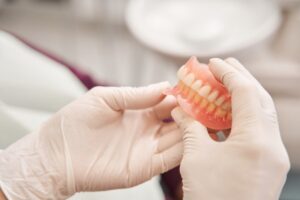5 Possible Complications of Ill-Fitting Dentures
April 4, 2025

Dentures are a valuable solution for people who have lost some or all of their natural teeth, helping restore both function and appearance. But when dentures don’t fit properly, they can cause more harm than good. Ill-fitting dentures can lead to a range of complications that affect not just your mouth, but your overall health and quality of life. Here are five possible complications of wearing dentures that don’t fit correctly.
Mouth Sores and Irritation
One of the most common problems caused by poorly fitting dentures is the development of sore spots and irritation. When dentures move around in the mouth, they can rub against the gums and soft tissues, creating painful ulcers or raw areas. These spots can make it difficult to eat, speak, or even wear the dentures for extended periods of time.
If not addressed, these sores can become infected, adding to the discomfort and increasing the risk of more serious oral health issues.
Difficulty Chewing and Speaking
Dentures are designed to restore your ability to chew food and speak clearly. But when they don’t fit properly, they can actually make these tasks harder. Loose dentures can slip or shift while eating, making it difficult to chew thoroughly or enjoy your favorite meals. Similarly, speaking with ill-fitting dentures can lead to slurred speech, mumbling, or clicking noises that may be frustrating or embarrassing.
Over time, this can affect your confidence and nutrition, especially if you start avoiding certain foods.
Bone Loss in the Jaw
Wearing ill-fitting dentures can accelerate bone loss in the jaw. When dentures don’t sit properly, they don’t distribute chewing pressure evenly across the gums and underlying bone. This uneven pressure can contribute to resorption, a natural process where the jawbone gradually shrinks after tooth loss. As bone loss continues, the fit of the dentures worsens, creating a frustrating cycle that can be difficult to break.
Regular dental checkups and adjustments can help slow this process and ensure a better fit over time.
Infections and Inflammation
Gum infections, such as denture stomatitis, are more likely to occur with poorly fitting dentures. This condition, often caused by a combination of bacteria, fungi, and constant irritation, can lead to redness, swelling, and discomfort in the soft tissues beneath the denture.
Infections are more common in those who wear their dentures overnight or don’t clean them properly. If you notice signs of inflammation or persistent bad breath, it’s time to check in with your dentist.
Changes in Facial Appearance
Ill-fitting dentures can gradually alter your facial structure. As the jawbone shrinks and support is lost, your cheeks and lips may begin to sink inward, causing a prematurely aged appearance. A well-fitting denture provides essential support to your facial muscles and helps maintain a natural look.
If your dentures no longer seem to support your face the way they used to, it could be a sign that a reline or replacement is needed.
If your dentures are causing pain, slipping, or just don’t feel right, don’t wait to seek help. Ill-fitting dentures are more than an annoyance; they can lead to serious oral health problems. A dentist can assess the fit of your dentures and offer solutions like adjustments, relines, or replacements to restore your comfort and confidence.
About the Practice
Are you experiencing issues with your dentures, or are you interested in getting a prosthesis to restore your look and functionality? Marble Dental McKinney can see to all your needs, whether it’s adjusting an ill-fitting denture or outfitting you with an appliance. In our state-of-the-art dental office, we offer a wide range of tooth replacement options, from fixed bridges and dentures to complex dental implant supported prosthetics. Schedule your appointment today online or call us at (214) 592-0441.
No Comments
No comments yet.
RSS feed for comments on this post.
Sorry, the comment form is closed at this time.
